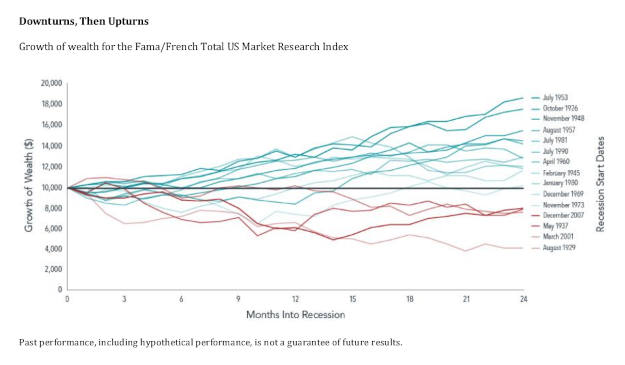Summer 2020
With activity in many industries sharply curtailed in an effort to reduce the chances of spreading the coronavirus, some economists say a recession has already begun. From a market perspective, we have experienced a steep drop in stock prices, as the growing chance of recession was incorporated into the price of stocks. Investors may be tempted to abandon equities and go to cash because of perceptions of recessions and their impact. But across the 2 years that follow a recession’s onset, equities have a history of positive performance. Thus abandoning equities now would not be wise.
Data covering the past century’s 15 US recessions show that investors tended to be rewarded for sticking with stocks. Exhibit 1 shows that in 11 of the 15 instances, or 73% of the time, returns on stocks were positive two years after a recession began. The annualized stock market return for the two years following a recession’s start averaged 7.8%.
Recessions understandably trigger worries over how markets might perform. But history can be a comfort for investors wondering whether now may be the time to move out of stocks.
Exhibit 1. Downturns, Then Upturns
Growth of wealth for the Fama/French Total US Market Research Index
Past performance, including hypothetical performance, is not a guarantee of future results.
In USD. Performance includes reinvestment of dividends and capital gains. Indices are not available for direct investment; therefore, their performance does not reflect the expenses associated with the management of an actual portfolio.
Growth of wealth shows the growth of a hypothetical investment of $10,000 in the securities in the Fama/French US Total Market Research Index over the 24 months starting the month after the relevant Recession Start Date. Sample includes 15 recessions as identified by the National Bureau of Economic Research (NBER) from October 1926 to December 2007.
NBER defines recessions as starting at the peak of a business cycle.






